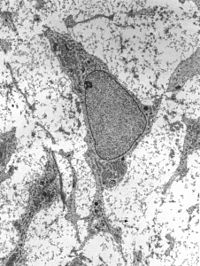
Photo from wikipedia
The P38-protein is known to be expressed in colorectal adenomas (CRA). Expression in low and high grade tubular adenomas is decreased when compared to adenocarcinomas and increased with regard to… Click to show full abstract
The P38-protein is known to be expressed in colorectal adenomas (CRA). Expression in low and high grade tubular adenomas is decreased when compared to adenocarcinomas and increased with regard to normal mucosa. We aimed to study P38 expression in human CRAs and the relationships to cell proliferation Ki67-protein, stem-phenotype CD133-protein and, to mTOR-protein (AKT pathway). METHODS The immunohistochemical expression of P38 was evaluated in CRAs on tissue microarrays. Data were analyzed with the Kendall-rank-correlation test. RESULTS Nuclear P38 correlated to low-grade dysplasia (Kendall p<0.01/tau=-0.254) and to decreased adenoma size (p<0.01/tau=-0.267). Nuclear P38 also correlated to cytoplasmic or membrane mTOR (p<0.01/tau=-0.223 and p<0.01/tau=-0.340) and to cytoplasmic CD133 (p<0.01/0.293). An inverse relationship was observed to Ki67 (p<0.00/ tau=--0.110). CONCLUSIONS Our results suggest an interference of P38 with initial steps of colorectal adenomagenesis. The correlation to mTOR suggests a biological crosstalk between the MAPK- and AKT-signaling-pathways in colorectal adenomagenesis at P38 level.
Journal Title: Minerva gastroenterologica e dietologica
Year Published: 2020
Link to full text (if available)
Share on Social Media: Sign Up to like & get
recommendations!